OUTREACH
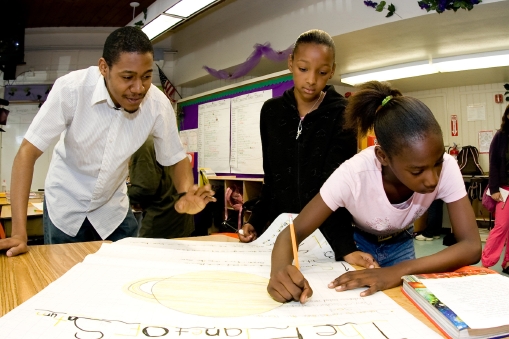
Marc Hem Lee 10, left, works with Tangelo Park residents during the spring break week he spent in Florida.
Students mentor disadvantaged children in Florida, hosted by Harris Rosen '61
For the second year in a row, a group of Cornell students spent spring break at Tangelo Park, Fla., as part of the Alternative Breaks program, an initiative of Cornell's Public Service Center.
For a week, they mentored and tutored preschool, elementary, middle school and high school students as part of the Tangelo Park Pilot Program, which was founded by Harris Rosen '61. In 1994, Rosen launched the program to not only provide free preschool and adult education classes, but a free college education within the Florida state system for all students in the working-class neighborhood of Tangelo Park (just outside Orlando) who graduate from high school. So far, he has assisted almost 400 students from the formerly drug- and crime-ridden neighborhood.
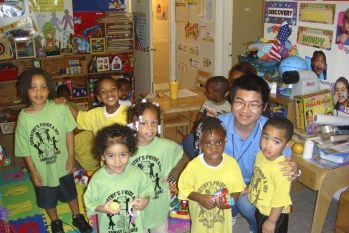
Chu Jian Frank Ma 13 works with 2- to 4-year-olds at a care provider s home in Tangelo Park. See larger image
During their stay, the Cornell students were hosted by Rosen, who covered all but their transportation costs, at his Rosen Shingle Creek resort and spent their days helping students in classes, working on classroom projects, preparing students for an astronomy night at the Orlando Science Center, reading stories, painting or playing educational games with the younger children.
In the evenings, they learned about how Tangelo Park parents partner with their children's schools to ensure the students are getting the education they need to succeed. They also talked with high school students about college life and college admissions, and attended a Tangelo Park Advisory Board meeting.
"This allowed us to see how the residents continue to work together to make their community one that is safe and welcoming," says Lisa Casey, a Cornell Law School student who led the student trip. "We also had a chance to speak with different [Tangelo Park] residents, hearing their firsthand accounts of the radical changes that have been made in their neighborhood in the last 15 years."
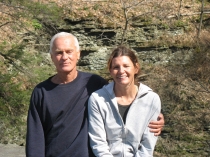
Harris 61 and Trisha Rosen on Sackett Bridge by Beebe Lake April 17. The Rosens visited Cornell to reconnect with the students who spent their spring break at Tangelo Park, Fla. See larger image
Since the program started, crime in the neighborhood has dropped by 67 percent, and the high school dropout rate has plummeted to 0 percent from 25 percent. Also, approximately 65 percent of high school students go on to college and graduate, according to Rosen.
"This kind of program, if replicated, will change our society," Rosen told USA Today in 2007. He says that this kind of charitable giving is particularly rewarding because of his personal involvement in the initiative. His larger hope is that others will emulate the program and provide disadvantaged children with hope.
"I applaud these young men and women for spending their spring break working in the schools with these wonderful youngsters," Rosen said in April during a visit to campus to reconnect with the students who spent their spring break at Tangelo Park.
The students on the trip were certainly inspired: "It was refreshing to ... interact with a community that was so animated by the changes it's made and continues to make," Casey reflects. "That aspect of it gave me hope that a similar initiative can be implemented elsewhere. The trip also revived my drive to provide whatever resources (be they in the form of services, money or goods) I can to helping those who have not been provided with the same opportunities that I've had throughout my life."
"I really enjoyed the interactions with the students and the kids," adds Frank Ma '12. "Being around all the kids and seeing the great amount of potential they had really made me realize how important it is to give every kid a great education."
Horticulture students head to Belize to show how gardens enrich schools
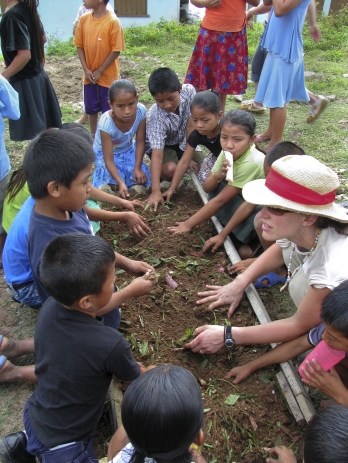
Students from a Santa Elena school and Erin Marteal learn about the importance of mulching for the newly planted raised beds. See larger image
Students in a horticulture course this past semester prepared for a spring break trip to Belize -- not to frolic at the beach but to show how school gardens can enrich curricula and serve as a foundation for community food-based and environmental education programs.
As part of the course, nine Cornell undergraduates, three Cornell Cooperative Extension educators and a team of three garden-based learning educators went to the Toledo district in southern Belize to focus on school gardens. The group worked with the U.S. nonprofit organization Plenty Belize, which has created school gardens in 32 of the region's 55 schools.
The Cornell students conducted a teacher training and created two school gardens. To link the gardens to school curricula and community programs, they also led numerous nutrition, market, composting and basic garden-based activities for some 140 children and their teachers in two Mayan communities, according to Marcia Eames-Sheavly, course instructor and youth program leader of the Cornell Garden-Based Learning Institute.
"Numerous people in the villages commented on [the students'] collective hard work and positive demeanor," says Eames-Sheavly. "They each went well beyond their own expectations for themselves, served as skilled gardeners and grew confident in their ability to lead garden-based learning activities with children."
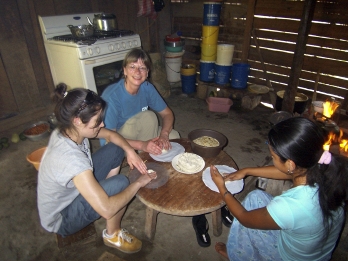
Linda Earley, a Cornell Cooperative Extension educator, and student Chelsea Clarke learn how to make tortillas. See larger image
The students will now document their activities and what they learned about organic gardening in a tropical context, sketch out the best gardens, conduct a case study and develop materials for garden-based learning activities for children and youth in New York state and Belize.
"We, as students, make our way through college hoping to find direction toward a suitable and desirable career, [which can be] difficult from hours of lectures alone," says Neele Reimann-Philipp '09. "It is the hands-on, practical experience that, I feel, can teach us these things in a more applicable way." The course, she says, is an example of "one of the most valuable ways to connect what I've learned as a student with what may someday become my career."
For Tyler Morgan '11, a landscape architecture major, "The highlight of the trip was working alongside the children, teachers and parents of the Santa Elena village to create their school garden. And protecting our shelter by killing an intruding scorpion with my machete."
The trip was made possible, in part, through funding from a Faculty Fellows in Service grant from Cornell's Public Service Center and the coordination efforts of extension aide Christine Hadekel.